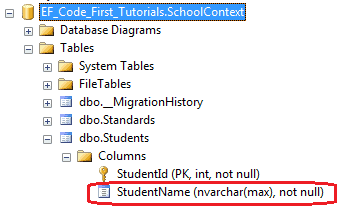The Required attribute can be applied to one or more properties in an entity class. EF will create a NOT NULL column in a database table for a property on which the Required attribute is applied.
using System.ComponentModel.DataAnnotations; public class Student { public int StudentID { get; set; } [Required] public string StudentName { get; set; } }
In the above code, the
Required attribute is applied to the StudentName property. So, EF API will create a NOT NULL StudentName column in the Students table, as shown below.
Now, if you try to save the
Student entity without assigning a value to the StudentName property then EF 6 will throw the System.Data.Entity.Validation.DbEntityValidationException exception, while EF Core will throw the Microsoft.EntityFrameworkCore.DbUpdateException exception.
Note: The
Required attribute can also be used with ASP.Net MVC as a validation attribute. Visit Implement Validations in ASP.NET MVC for more information.




.png)
0 comments:
Post a Comment
Note: only a member of this blog may post a comment.